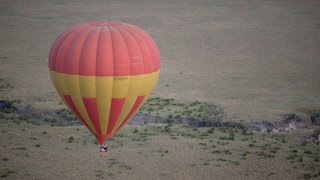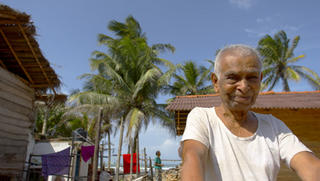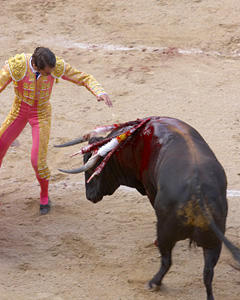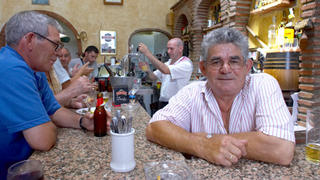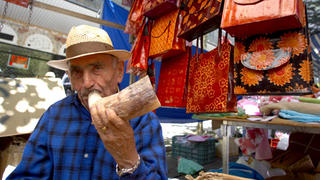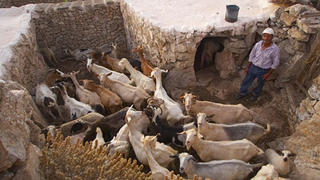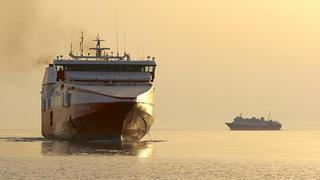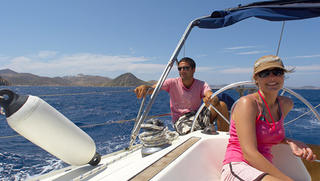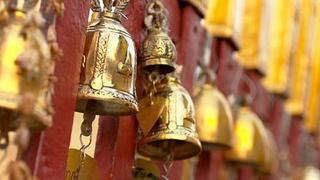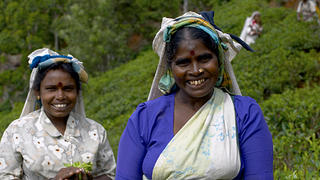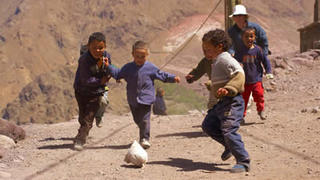
It's impossible to spend seven days on a yacht with eight blokes and not end up talking about women. My companions for the Greek Islands sailing when I reached Santorini were a cocktail of youth, exuberance, wisdom and experience. Some of us were nursing wounds left behind after long term commitments, some were defining the boundaries of new relationships and the very nature of commitment, and others were desperately trying to unscramble the puzzle of dating in the 21st century. Watching the world's most magnificent sunset on Santorini is an evocative experience which digs deep into your heart. Rather than a destination that invites catharsis, It is a place which elicits your greatest sense of "Joie de Vie". You need not listen hard to learn what makes you happy. It is the place where I realised I would ask Victoria to marry me.
The next few weeks I travelled a little further through the Islands and then southern Spain. I enjoyed engaging counsel all the while, so much so that I was reminded of how absurdly fortunate my whole life has been and currently is. In Cordoba we debated the ability of anyone to make a decision as significant as whether to marry somewhat or not. In Granada we came face to face with the consequences of living too much of your life alone and without someone to love. In Barcelona we were ambushed by old friends and enjoyed the company of like-minded souls. The day before I left Madrid I learned about the Spanish Matadors and why they are so revered by the women. I recognised my own imminent danger - dangling my red cape in front of El Toro will only get me gored if I fail to finish the job.
Back in Melbourne there were echoes of Spain everywhere. I drank my Tinto De Verano (which I only recently discovered to translate literally as "Summer Wine") and sought counsel with the tapas team at Yarraville's cigar bar. Tales of how to propose were canvassed and commended. I was the only one at the table who realised that the discussion had moved away from historical reflection and into the realms of plotting the prescription. A few weeks later I was back on the road, traversing the tea plantations in Sri Lanka. Once again I was gifted with companions of the first order and the benefit of a female point of view became the catalyst for action. Late one night, while staying at Nuwera Eliya's Grand Hotel, I found myself selecting some gem stones to accompany my Victoria as her constant reminder of my promise to her. A large but soft toned 'pink sapphire' and two accompanying minor carat 'yellow sapphires' were purchased.
The previous year I had returned from Sri Lanka with a ruby, the more familiar and dark coloured version of a pink sapphire. That stone was requested by Victoria's father and later worked into a ring to celebrate 40 years of marriage. What greater omen could I ask for? I was worried that anything less than a diamond might be received with disappointment, but Sri Lanka is no more blessed with diamonds of it's own than I am blessed with a fortune of my own. It seemed important to consider not just the rock, but where it came from. Should Victoria ever have the chance to visit the Grand Hotel she would be the happiest woman on the planet. She is a girl who appreciates the pleasure of first class service and accommodation. I will admit that to this very day I have not figured how on earth I could get her from Colombo to Nuwera Eliya without subjecting her to travel sickness of the worst kind - the magnificent backdrop of the hill country tea plantations are accessible only by train or bus, both of which sway and rattle their way up the steep ascent over the course of many many hours. All of which is moot… Destiny has been determined for these stones.
The next problem was one of presentation. Having decided that it would be the height of folly to design a ring myself the plan was now to propose with the stones ‘au naturale’. When I reached Kandy I stumbled across the most elegant solution I could have wished for. Instead of a ring-box with a set diamond popping out my Victoria would first lay eyes upon a solid silver Lime Box with the stones carefully wrapped within. The style of Lime Box in question operates like a clam-shell and is layered with fine filigree work. They are popular for powdered lime because the silver is inert and hence ideal for keeping the contents safe and dry within. Knowing Victoria is not likely to develop a bettle chewing habit anytime soon I bought her a very large lime box last Christmas for keeping jewellery in rather than lime. It was the very same little jewellery shop in Kandy that I bought so many ear-rings, necklaces and bracelets last year. I have made a habit of collecting fine silver vesicles to wrap up her gems. Anything less would simply be inconsistent.
The sapphires now had a proper home. I tucked them away into a slip pocket of my camera bag and they would remain there for another ten weeks.
Returning to Melbourne I had a few more things to sort out before the big event could proceed. First was to gain the permission of her father. I consider this a far more difficult question than the question itself. Until now I have been able to adjust to each step at my own pace and without any public scrutiny. It was my journey and mine alone, until this point. Requesting permission makes it all ‘official’. It also means that Victoria’s father is forced into declaring his opinions, something which has never been of relevance or discussion in the previous 18 months. Yesterday he merely had a daughter with a boyfriend. Today he has to decide if he wants a son-in-law. I really didn’t know what he would say, and I really didn’t know what I would say either. I was unprepared and uncomfortable in the extreme.
The nearest I have ever come to such a situation was when a girlfriend’s father offered me $8,000 to elope with her. He said that it cost him a fortune to get the other two married in style, and he figured that we could use the money and everyone would be happy. Well, everyone but me it seemed. Five years later I was wondering how I went from turning down cash in the hand to begging for someone’s hand. I met the potential father-in-law for morning tea, showed him the rocks, and he welcomed me into the family. He was very generous about the whole affair.
Now that everything was official I started to realise that I had to think about who needed to know what was going to happen before the great Victoria Falls Palaver of 2005. It seemed to me that some people might feel a little hurt if they didn’t know what was going on until after the event, while others would just explode with such a big secret to keep silent. In the end I told a lot more people than I thought I would. I tried to avoid any tentative connections that might work back to Victoria, but soon realised that once you tell some people you kinda have to tell a lot of people. The tough bit was not telling Victoria’s mum or sister. My father-in-law to be already pointed out that Victoria’s mum would give the game away in two minutes – not intentionally but because next time we all met she would get way too excited or start crying or something. We just have to make sure that mother-in-law to be will be near a phone when the first rays of African sunlight hit the pink sapphire.
It was far more difficult not telling her sister, Sarah. They are close. Very close. I really wanted to have her permission too and knew that Sarah would enjoy the cunning trickery of the proposal, not to mention my need for her input on the still un-silenced doubt over sapphires versus diamonds. But the same day I would be heading for Africa our Sarah would be flying to Europe to see her long distance man. I figured she had enough stuff to process in her own life without the unnecessary distraction of words like, wedding, marriage, sapphires and diamonds.
Above all else this had to be a secret. There are so few moments in life that we get to make our loved ones cry because they are so happy. It’s a pleasure so fine and rare that you simply don’t forget them, ever. I wanted Victoria to always remember the moment with unparalleled clarity. It had to be a complete surprise. The person most likely to give the game away was, of course, me. Victoria had made no secret of her wishes over the past 12 months and I had made no secret of my reluctance. My worst fear is that Victoria would give up on me before she saw the pink sapphire. So long as she doesn’t get frustrated and dump me, the surprise will be exquisite.
My palpably poor judgment in women before meeting Victoria had led me to question whether I would ever take part in such an institution. The finality of it all still terrifies me. As it damned well should. But a wedding is different for men and women. Men can decide they’ll be with a girl and that’s that, but a girl needs to see it happen in ritual and public display. A girl wants her day. This is not a uniquely western construct by the way. There’s a reason weddings have a bride and bride’s groom. It all comes back to her. In some religions the man doesn’t even appear in the ceremonies at all. I don’t mean to sound unromantic. If you had my parents you’d think twice about marriage too! When you’re 15 years old marriage has a connotation of, ‘happy ever after’. When you’re 35 marriage is greeted with, ‘good luck, I hope you do better than most’. Neither Victoria nor myself are spring chickens, and there’s a lot of fatal errors we won’t be making now or in the future. I just can’t imagine anyone who would be a better fit and a better influence on my life – I’d be crazy to let this one get away.
Just a few weeks before Victoria joins me in Africa and I am enroute via Bangkok. Just one more detail needs tending to. I decided that a girl needs a ring when gets a proposal, so a ring she will get. The streets of Blangphambu are littered with jewellery stalls and shops selling every kind of tacky and tasteless. I come across many rings with spiders on them, or a bulls skull, or much worse. I figure that if she says yes to a really bad ring then I know it’s not my money she’s after! Once again I am saved by wise counsel. A friend was unexpectedly in Bangkok the very same day as me, and his travelling companion was a female of the most sensible disposition. We went shopping and an hour later I had an $8 stainless steel ring with a single glass center-piece. Her view was that you don’t want to spoil the moment – if the ring lacks plausibility then I might be shoved into a barrel and tossed over the falls before Victoria realises that the ring was a joke and the proposal wasn’t! As it stands I think the $8 purchase near Khao San Road simply screams, “oh my god what were you thinking?”
And that brings us to the moment itself. I started writing this story when I first arrived in Kenya. My mind’s eye has assumed that the moment itself will simply be a consequence of moments. It will happen of it’s own accord, like the way a drop of water slowly builds on the tip of a fern before gravity overwhelms surface tension and the droplet plummets earth-bound. I just need to put all the essential elements together and nature will take its course. Maybe I should leave it to Victoria to write the postscript – I bought the stones but the ring will be hers.







